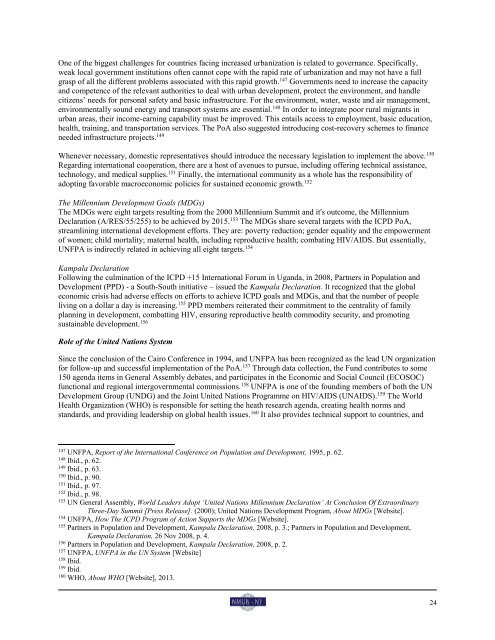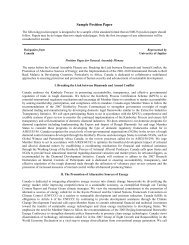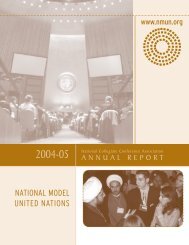UNFPA Background Guide - National Model United Nations
UNFPA Background Guide - National Model United Nations
UNFPA Background Guide - National Model United Nations
Create successful ePaper yourself
Turn your PDF publications into a flip-book with our unique Google optimized e-Paper software.
One of the biggest challenges for countries facing increased urbanization is related to governance. Specifically,<br />
weak local government institutions often cannot cope with the rapid rate of urbanization and may not have a full<br />
grasp of all the different problems associated with this rapid growth. 147 Governments need to increase the capacity<br />
and competence of the relevant authorities to deal with urban development, protect the environment, and handle<br />
citizens’ needs for personal safety and basic infrastructure. For the environment, water, waste and air management,<br />
environmentally sound energy and transport systems are essential. 148 In order to integrate poor rural migrants in<br />
urban areas, their income-earning capability must be improved. This entails access to employment, basic education,<br />
health, training, and transportation services. The PoA also suggested introducing cost-recovery schemes to finance<br />
needed infrastructure projects. 149<br />
Whenever necessary, domestic representatives should introduce the necessary legislation to implement the above. 150<br />
Regarding international cooperation, there are a host of avenues to pursue, including offering technical assistance,<br />
technology, and medical supplies. 151 Finally, the international community as a whole has the responsibility of<br />
adopting favorable macroeconomic policies for sustained economic growth. 152<br />
The Millennium Development Goals (MDGs)<br />
The MDGs were eight targets resulting from the 2000 Millennium Summit and it's outcome, the Millennium<br />
Declaration (A/RES/55/255) to be achieved by 2015. 153 The MDGs share several targets with the ICPD PoA,<br />
streamlining international development efforts. They are: poverty reduction; gender equality and the empowerment<br />
of women; child mortality; maternal health, including reproductive health; combating HIV/AIDS. But essentially,<br />
<strong>UNFPA</strong> is indirectly related in achieving all eight targets. 154<br />
Kampala Declaration<br />
Following the culmination of the ICPD +15 International Forum in Uganda, in 2008, Partners in Population and<br />
Development (PPD) - a South-South initiative – issued the Kampala Declaration. It recognized that the global<br />
economic crisis had adverse effects on efforts to achieve ICPD goals and MDGs, and that the number of people<br />
living on a dollar a day is increasing. 155 PPD members reiterated their commitment to the centrality of family<br />
planning in development, combatting HIV, ensuring reproductive health commodity security, and promoting<br />
sustainable development. 156<br />
Role of the <strong>United</strong> <strong>Nations</strong> System<br />
Since the conclusion of the Cairo Conference in 1994, and <strong>UNFPA</strong> has been recognized as the lead UN organization<br />
for follow-up and successful implementation of the PoA. 157 Through data collection, the Fund contributes to some<br />
150 agenda items in General Assembly debates, and participates in the Economic and Social Council (ECOSOC)<br />
functional and regional intergovernmental commissions. 158 <strong>UNFPA</strong> is one of the founding members of both the UN<br />
Development Group (UNDG) and the Joint <strong>United</strong> <strong>Nations</strong> Programme on HIV/AIDS (UNAIDS). 159 The World<br />
Health Organization (WHO) is responsible for setting the heath research agenda, creating health norms and<br />
standards, and providing leadership on global health issues. 160 It also provides technical support to countries, and<br />
147<br />
<strong>UNFPA</strong>, Report of the International Conference on Population and Development, 1995, p. 62.<br />
148<br />
Ibid., p. 62.<br />
149<br />
Ibid., p. 63.<br />
150<br />
Ibid., p. 90.<br />
151<br />
Ibid., p. 97.<br />
152<br />
Ibid., p. 98.<br />
153<br />
UN General Assembly, World Leaders Adopt ‘<strong>United</strong> <strong>Nations</strong> Millennium Declaration’ At Conclusion Of Extraordinary<br />
Three-Day Summit [Press Release]. (2000); <strong>United</strong> <strong>Nations</strong> Development Program, About MDGs [Website].<br />
154<br />
<strong>UNFPA</strong>, How The ICPD Program of Action Supports the MDGs [Website].<br />
155<br />
Partners in Population and Development, Kampala Declaration, 2008, p. 3.; Partners in Population and Development,<br />
Kampala Declaration, 26 Nov 2008, p. 4.<br />
156<br />
Partners in Population and Development, Kampala Declaration, 2008, p. 2.<br />
157<br />
<strong>UNFPA</strong>, <strong>UNFPA</strong> in the UN System [Website]<br />
158<br />
Ibid.<br />
159<br />
Ibid.<br />
160<br />
WHO, About WHO [Website], 2013.<br />
24









